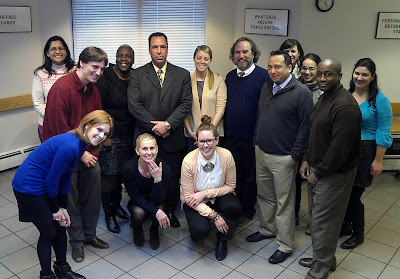Category: treatment
Working in Recovery: Running residential programs
 From our humble beginningsof 17 individuals coming together to form a community focused on living drug free, Odyssey House has developed into a multi-service entity providing a safe haven for the neediest New Yorkers. From the newborn child to the elderly man or woman, Odyssey House is equipped to meet the specific needs of a wide range of clientele struggling with substance use disorders, mental illness and homelessness.
From our humble beginningsof 17 individuals coming together to form a community focused on living drug free, Odyssey House has developed into a multi-service entity providing a safe haven for the neediest New Yorkers. From the newborn child to the elderly man or woman, Odyssey House is equipped to meet the specific needs of a wide range of clientele struggling with substance use disorders, mental illness and homelessness. Download our new brochures!
Learn more about Odyssey House’s programs and services in our new brochures. You can download them from our Admissions page or email us at admissions@odysseyhouseinc.org to order a hard copy set. Give us your feedback in the comments or on our Facebook page.
New program to enhance adolescent treatment in the Bronx
Odyssey House Outpatient Services is introducing a new evidence-based program for adolescent boys (12-17 years) with substance use disorders. Called the Seven Challenges, the program will be incorporated into our existing BUY-In program, which was recently awarded a three-year, $1.3 million contract by the NYS Office of Alcoholism & SubstanceAbuse Services (OASAS).
Odyssey House wins grant to expand adolescent outpatient services
Odyssey House welcomes a new board chairman
Odyssey House is pleased to announce the election of Richard O’Connor to chairman of the Odyssey House Board of Trustees. Mr. O’Connor, vice president of marketing at CVS Caremark, has served on the Board of Trustees as vice chairman from 2010 and has held positions on the strategic planning and finance committees since joining the board in 2002.
Mr. O’Connor said he sees his role as one of championing the holistic approach to recovery and rehabilitation pioneered at Odyssey House for people with substance use disorders and mental illness.
 |
| Passing the torch. George Rosenfeld (right), retiring as board chairman after ten years, congratulates Rick O’Connor (left) on his election to the chairmanship. |
“Over the ten years I have been closely involved with Odyssey House I have seen the agency grow into a multi-faceted social services organization that offers a continuum of care for some of the most vulnerable members of our society. Many of the individuals who turn to Odyssey House for help with substance abuse and mental health problems have been homeless, suffer from physical and mental trauma, and have educational deficits that severely limit their job prospects and ability to take care of themselves and their family.
“I am excited to be a part of this mission and look forward to continuing the organization’s role as a leader in the field of recovery for a broad population of teens, families, senior citizens, and people with medical and mental health problems. I am also honored to be following in the footsteps of George Rosenfeld who retired as chairman following ten years of innovative leadership.”
Peter Provet, Ph.D., president and chief executive officer of Odyssey House, said, “Rick has been an invaluable member of our board for ten years. We are delighted with his election to Chairman of Odyssey House. He brings an extensive background in health care, wellness, and the treatment of intellectual and learning disabilities to our recovery-based organization, both as a skilled communicator and a strategic business thinker.”
Visit our YouTube channel to watch a short tribute to George Rosenfeld’s tenure as chairman.
The Spring 2012 newsletter is now available
The Spring 2012 edition of Odyssey House News is now available online! Read about our new housing programs, get an update on OHROCS (Odyssey House Recovery Oriented Care System), and more. Check it out (pdf) and let us know what you think in the comments or on our Facebook page.
It’s Poor Policy to Test Drug Welfare Recipients
Dr. Peter Provet urges lawmakers to reconsider legislation requiring welfare recipients to take drug tests and calling instead for greater treatment and prevention funding.
States consider drug testing welfare recipients” prompts the question: Why stop at poor people who receive public benefits? For example, why not test all students in state-funded schools and mothers who give birth in publicly funded hospitals?
In Arizona and Missouri, an individual is tested if there is reason to believe he or she is a substance abuser. The legislation proposed in Colorado would test all applicants for the state’s Temporary Assistance for Needy Families program. This stigmatizes poor families and is ultimately a losing battle. Money should be dedicated to more prevention, education, treatment, and broad public-relations campaigns that extol the benefits of a wellness lifestyle and drug-free life.
Testing might seem like an easy and convenient solution. But it is often counterproductive, expensive and a poor substitute for sound public policy.
Peter Provet, president & CEO; Odyssey House; New York City
Odyssey House is a non-profit social services organization.
Taxing Medical Marijuana
In a letter to The New York Times, Dr. Peter Provet urges municipalities that collect taxes from medical marijuana businesses to direct some of that additional revenue to under-funded treatment and prevention programs.
To the Editor:
“Struggling Cities Turn to a Crop for Cash” (news article, Feb. 12) doesn’t mention a major issue of concern that has to be considered before claims of attractive financial benefits from taxing medical marijuana can be made.
In the states mentioned – California, Colorado, Maine and Oregon – 3.2 million people are not receiving the treatment services they need for drug abuse and dependence. California alone accounts for 2.3 million people with untreated substance abuse disorders.
Before hard-pressed municipalities, in these and other states around the country, look at medical marijuana as a new source of tax revenue to finance essential services, taxpayers should be given the opportunity to consider allocating some of this money to under-supported treatment and prevention programs.
This will not mitigate the effects of untreated substance abuse, but it will help send a clear message to young people that marijuana, prescribed or not, has addictive potential that too often requires intensive treatment.
PETER PROVET
President and Chief Executive
Odyssey House
New York, Feb. 13, 2012
To see additional comments on this issue by Peter B. Bensinger, former administrator of the Drug Enforcement Administration, and Robert L. DuPont, former director and founder of the National Institute on Drug Abuse, please click here.
Odyssey House wins housing award
Housing support for homeless families with substance use disorders
Odyssey House has been selected by the New York State Office of Alcoholism & Substance Abuse Services (OASAS) to receive $499,000 in annual funding to provide 20 permanent supportive housing apartments with case management and vocational services staff for families who were homeless when they entered an Odyssey House intensive residential facility, and are now scheduled to complete that course of treatment.
This innovative housing model will target chronically homeless families; families at serious risk of becoming chronically homeless; and other currently homeless families, in which the head-of-household has a substance use disorder.
The award was announced by New York Governor Andrew M. Cuomo, who called the initiative “another component of the New York/New York III Agreement that has brought together many State and City agencies and departments in a multi-year effort to address homelessness.”
Odyssey House has significant experience working with families in residential and outpatient treatment settings as well as supportive housing programs. At any one time up to 210 women and children live in specially equipped family accommodations in one of the organization’s treatment centers. The comprehensive services provided include: intensive substance abuse, mental health, and family counseling; medical and dental care; vocational, educational, legal, and housing support; and onsite licensed childcare services that include nurseries and early Head Start programs.
Dr. Peter Provet, President and CEO of Odyssey House, welcomed the Governor’s support for families in treatment and added: “As our understanding of what it means to be in recovery evolves, and we develop programs that address the bio-psycho-social needs of families in treatment, the provision of safe, affordable housing is a key component of a holistic approach to treating substance abuse disorders.”
Click here to read the full press release.





